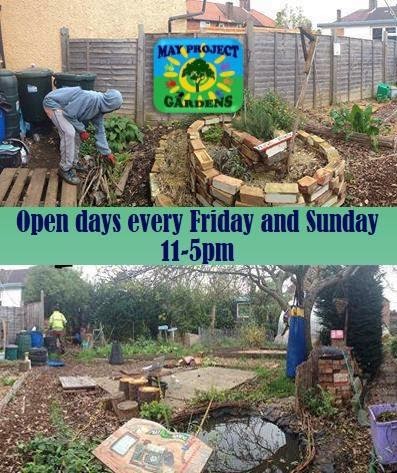In May this year CFGN went to meet KMT who lives and works at ‘May Project Gardens’ in the suburbs of Morden in South London.
We’d heard a lot about the project as KMT, a freedom teacher with a background in music, has turned his house and garden into a living permaculture space.
May Project Gardens was founded in 2009 on the site which has approximately 250sqm of growing space where a variety of fruits and vegetables are grown by individuals who volunteer their time to help maintain the project. On arriving at the gate it’s clear to see how much work has gone into the garden as it bursts with colour, plants and permaculture design utililizing all the different edges in the area. There is a medium sized polytunnel, a small herb garden, two large main crop beds, a wildlife zone (which includes a pond and a wild flower bed), a small food forest garden and four different composting systems.
Perching by the pond KMT explains: “The main aim of May Project Gardens is to bring communities closer together to act collectively. The project provides practical examples and explores the practical challenges it takes to be green. Accessing tools necessary to educate communities about the issues that affect the environment and as a result the effects they have on those inhabiting the planet.”
There has to be a balance of maintaining the garden (earth care) my well being, my home (people care) and fair share (business and finance). Each permaculture space will different but I tend to think resources and finance will be the most dominant themes for those living in city environments especially as for the first time 50% of of the world’s population live in urban environment and this is set to increase.”
He continues: “There exists a real opportunity for a way of living Green in a City, one which is more in keeping with the land. Working with nature, technology, resources and people are all-available to move away from the existing model of us as city folk as only consumers, which places a premium on the basics of living such as food, water, shelter and heating.”
“Yet my voice and the countless of others that would reap the most benefit from these transitions are not the voices that are heard or define the way the city’s are greened, they are not the voices of power, they are not the voices of privilege. They are not the voices of women, voices of color, voices of marginalized. The voices that need to be in the forefront of any green movement that really wants to change.”
Volunteer days at the site are Fridays and Sunday 11am-5pm. The project also runs Permaculture and Hip-Hop courses courses and engages with Training for Transformation popular education practices.
E-mail mayprojectgardens@gmail.com for more info

Pingback: Support ‘Food, Hip Hop & Green Economy’ course for Young People | Community Food Growers Network | connect, cooperate, support, defend, campaign and celebrate